Related Research Articles

Apamea remissa, the dusky brocade, is a species of moth of the family Noctuidae. It is distributed throughout Europe and Turkey, ranging across the Palearctic realm to Siberia, Manchuria and Japan. It has also been reported from Alaska.
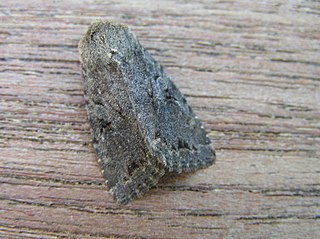
Fissipunctia ypsillon, the dingy shears, is a species of moth of the family Noctuidae. It is found in the Palearctic realm.

Pyrausta despicata, the straw-barred pearl, is a species of moth of the family Crambidae. It was described by Giovanni Antonio Scopoli in his 1763 Entomologia Carniolica.

Scoparia subfusca is a species of moth of the family Crambidae. It is found in Europe.
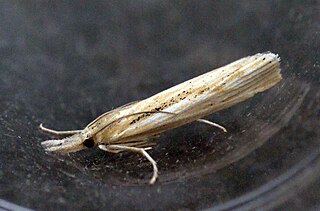
Pediasia aridella is a species of moth of the family Crambidae. It was described by Carl Peter Thunberg in 1788 and is found in Europe. There are three recognised subspecies.

Anaplectoides prasina is a species of moth of the family Noctuidae. It is found in both the Palearctic and Nearctic realms.
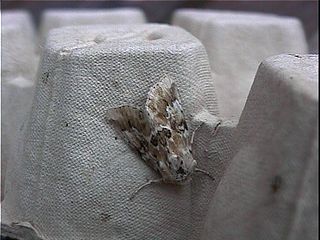
Eremobia ochroleuca, the dusky sallow, is a moth of the family Noctuidae. It is found in Central and Southern Europe and the Middle East.
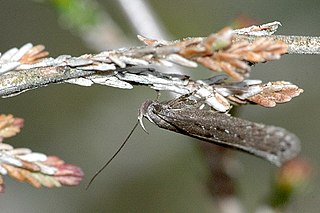
Neofaculta ericetella is a moth of the family Gelechiidae. It is found in Europe and Asia Minor.

Elachista freyerella is a moth of the family Elachistidae that is found in all of Europe, except the Balkan Peninsula. It is also found in North America.

Hellinsia tephradactyla is a moth of the family Pterophoridae found in most of Europe. It was first described by the German taxonomist Jacob Hübner in 1813.
Xyroptila peltastes is a moth of the family Pterophoridae. It is found in Australia.
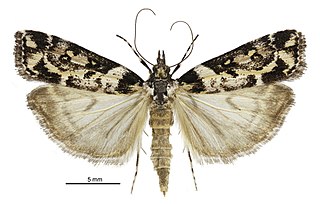
Eudonia diphtheralis is a species of moth in the family Crambidae. It is endemic to New Zealand.
Caryocolum marmorea is a moth of the family Gelechiidae. It is found from Scandinavia to the Mediterranean islands, and from Ireland to Poland, Hungary and Greece. It is also found on the Canary Islands and Madeira. It is also found in North America.
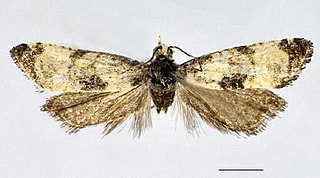
Cochylis dubitana, the little conch, is a moth of the family Tortricidae. It is found in China (Heilongjiang) and most of Europe. and the Caucasus. It is also found in North America, where it has been recorded from Colorado, Maine, Ontario and Washington.
Helcystogramma arotraeum is a moth in the family Gelechiidae. It was described by Edward Meyrick in 1894. It is known from Japan, Taiwan, China, Myanmar, Thailand, northeastern India, Sri Lanka, Malaysia, and Indonesia.
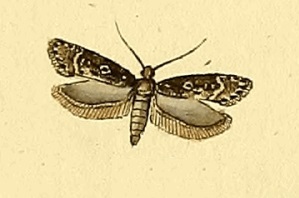
Gelechia sororculella, the dark-striped groundling, is a moth of the family Gelechiidae. It is widely distributed from Europe, throughout Siberia to the Russian Far East.
Tylostega photias is a moth in the family Crambidae. It was described by Edward Meyrick in 1894. It is found on Borneo.
Ardozyga haemaspila is a species of moth in the family Gelechiidae. It was described by Oswald Bertram Lower in 1894. It is found in Australia, where it has been recorded from New South Wales and South Australia.
Torodora parasema is a moth in the family Lecithoceridae. It was described by Edward Meyrick in 1913. It is found in India.
Psittacastis stigmaphylli is a moth in the family Depressariidae. It was described by Lord Walsingham in 1912. It is found on Jamaica.
References
- ↑ Nuss, Matthias; Landry, Bernard; Vegliante, Francesca; Tränkner, Andreas; Mally, Richard; Hayden, James; Bauer, Franziska; Segerer, Andreas; Li, Houhun; Schouten, Rob; Solis, M. Alma; Trofimova, Tatiana; De Prins, Jurate & Speidel, Wolfgang (2003–2014). "GlobIZ search". Global Information System on Pyraloidea. Retrieved July 15, 2014.
- ↑ Transactions of the Entomological Society of London. 1894 (3): 464.
 This article incorporates text from this source, which is in the public domain .
This article incorporates text from this source, which is in the public domain .